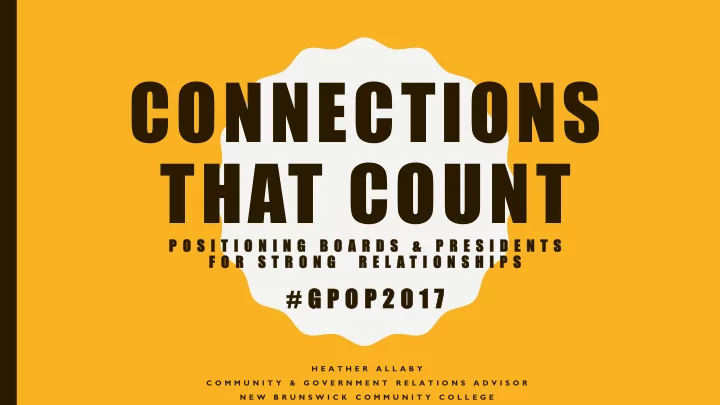

CONNECTIONS THAT COUNT P O S I T I O N I N G B O A R D S & P R E S I D E N T S F O R S T R O N G R E L A T I O N S H I P S # G P O P 2 0 1 7 H E A T H E R A L L A B Y C O M M U N I T Y & G O V E R N M E N T R E L A T I O N S A D V I S O R N E W B R U N S W I C K C O M M U N I T Y C O L L E G E
WHY IS GOVERNMENT RELATIONS IMPORTANT? 1. Public investments are a major source of revenue for our institutions. 2. Public policies can help (or hinder!) our success as institutions. 3. Points1 and 2 are also true for countless other organizations, individuals and causes.
ALIGNED AUTHENTIC ONGOING
ARISTOTLE LOGOS PATHOS ETHOS
LOGOS • Use facts that resonate with your audience • Demonstrate that you’ve done your homework
PATHOS • Consider how your audience feels • Share compelling stories • Use visuals to bring your message to life • Be enthusiastic about your message yourself
ETHOS • Demonstrate mutual benefit and alignment • Keep your facts and stories are straight • Build trust between “asks” • Do what you say you’ll do
LOGOS PATHOS ETHOS
HEAD HEART CRED
TELL ME A STORY “ Te l l m e t h e f a c t s a n d i ’ l l l e a r n . Te l l m e t h e t r u t h a n d I ’ l l b e l i eve . B u t t e l l m e a s t o r y a n d i t w i l l l i ve i n my h e a r t f o reve r.” N A T I V E A M E R I C A N P R O V E R B
Source: DesignaABetterBusiness.com licensed by Creative Commons
S U B What is the J story about? E C T
What do you G O want to achieve A with this story? L
A What is your U D story’s audience? I What are their E N needs? C E
B What does your E audience think, feel, F know, want before O they experience R your story? E
What do you need S to introduce? C What should be E set up or N E explained?
M A K E The audience’s Y O U R ‘a - ha’ moment. P O I N T
C The end of your O N story. C What is the L conclusion? U S What is your call to I action? O N
What does your A audience think, feel, F know, want after T they have E experienced your story? R
NOW IT’S YOUR TURN
STORYTELLING THROUGH SOCIAL MEDIA
FACEBOOK • 1.89 billion monthly active users • 79% of internet users use Facebook • Demographic skews older and female
LINKEDIN • 450 million members but only 25% actively visit • 29% internet users use LinkedIn • Slightly higher educational attainment and income levels
31% internet users use Pinterest 18% internet users use Snapchat 32% internet users use Instagram Skews younger Skews female Skews younger (much younger!)
TWITTER • 328 million monthly active users • 24% internet users use T witter • Slightly higher educational attainment
GETTING STARTED • Setting up a T witter profile • Start following; start posting. • Keep it real.
THERE’S JUST SO MUCH GOING ON… • Creating a Twitter list can help you organize who you’re following. • Consider creating lists for: – Elected officials – Board members – Key industry partners – Other colleges
4 TIPS FOR KILLER CONTENT 1.Photos 2.Hashtags 3.Tagging others 4.Value-add retweets
IF YOU WOULDN’T SAY IT HERE…
DON’T WRITE IT HERE.
NOW IT’S YOUR TURN!
Q&A
THANKS!
Recommend
More recommend